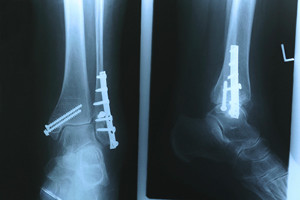Did I Break My Ankle?
Tuesday, 27 July 2021 00:00 Broken ankles occur when any one of the bones in the ankle joint either fracture. The bones in the ankle joint include the tibia (shin bone), the fibula (back of the ankle), and the talus (the small bone between the heel bone and the tibia and fibula). Signs of a broken ankle include swelling, pain, bruising, tenderness, inability to bear weight, and an inability to walk on the affected leg. It can be difficult to tell the difference between a sprained ankle and a broken ankle. Sprains occur when the ligaments connecting the bone are torn. Patients who have injured their ankle and believe that it is sprained or fractured should consult with a podiatrist for a proper diagnosis. A podiatrist can use a variety of methods that include physical examination, an X-ray, or even a CT or MRI scan to determine the cause of your ankle pain.
Broken ankles occur when any one of the bones in the ankle joint either fracture. The bones in the ankle joint include the tibia (shin bone), the fibula (back of the ankle), and the talus (the small bone between the heel bone and the tibia and fibula). Signs of a broken ankle include swelling, pain, bruising, tenderness, inability to bear weight, and an inability to walk on the affected leg. It can be difficult to tell the difference between a sprained ankle and a broken ankle. Sprains occur when the ligaments connecting the bone are torn. Patients who have injured their ankle and believe that it is sprained or fractured should consult with a podiatrist for a proper diagnosis. A podiatrist can use a variety of methods that include physical examination, an X-ray, or even a CT or MRI scan to determine the cause of your ankle pain.
Broken ankles need immediate treatment. If you are seeking treatment, contact Dr. Ronald K. Olm from Grand Traverse Foot & Ankle Center. Our doctor can provide the care you need to keep you pain-free and on your feet.
Broken Ankles
A broken ankle is experienced when a person fractures their tibia or fibula in the lower leg and ankle area. Both of these bones are attached at the bottom of the leg and combine to form what we know to be our ankle.
When a physician is referring to a break of the ankle, he or she is usually referring to a break in the area where the tibia and fibula are joined to create our ankle joint. Ankles are more prone to fractures because the ankle is an area that suffers a lot of pressure and stress. There are some obvious signs when a person experiences a fractured ankle, and the following symptoms may be present.
Symptoms of a Fractured Ankle
- Excessive pain when the area is touched or when any pressure is placed on the ankle
- Swelling around the area
- Bruising of the area
- Area appears to be deformed
If you suspect an ankle fracture, it is recommended to seek treatment as soon as possible. The sooner you have your podiatrist diagnose the fracture, the quicker you’ll be on the way towards recovery.
If you have any questions, please feel free to contact one of our offices located in Traverse City and Kalkaska, MI . We offer the newest diagnostic and treatment technologies for all your foot care needs.





